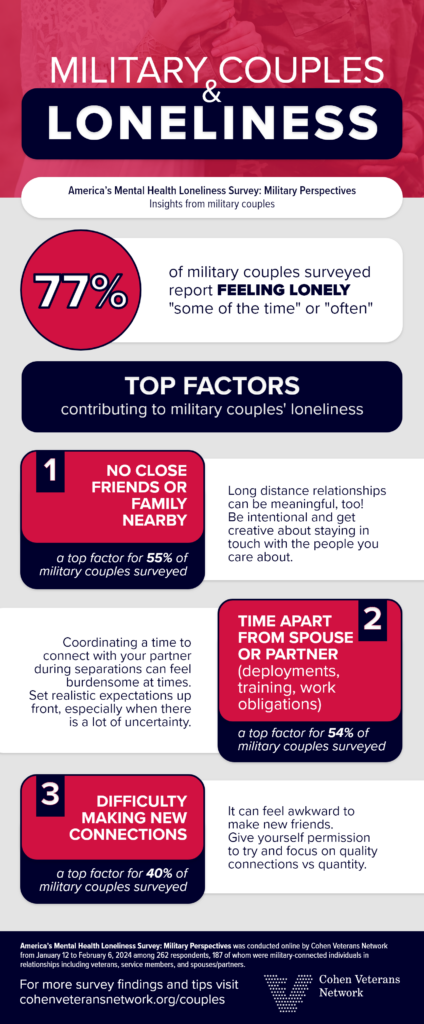As CVN is filling the gaps in care, we continuously seek to understand in real time the unique experiences of the military community. In our new America’s Mental Health Loneliness Survey: Military Perspectives we captured military couples’ experiences with loneliness and isolation. Our survey revealed:
- Three-fourths (77%) of military couples surveyed reported feeling lonely “some of the time” (50%) or “often” (27%).
Among the top factors contributing to loneliness as discovered in the survey:
- Over half (55%) of military couples surveyed reported no close friends or family nearby
- Over half (54%) of military couples surveyed reported time apart from spouse partner (deployments, training, work obligations)
- Two-fifths (40%) of military couples surveyed reported difficulty making new connections
- Over one-third (33%) of military couples surveyed reported having relocated to a new community
- One-third (30%) of military couples surveyed reported a lack of belonging in local community

But there are things military couples can do to help manage feelings of isolation. Here, we share tips to combating loneliness and enhancing connection:
Tip: Set Expectations During Time Apart
Coordinating a time to connect with your spouse or partner during deployments or trainings can feel burdensome. When you have plans to connect but aren’t able to do so due to unforeseen circumstances, you can feel disappointed and further detached. Set clear and realistic expectations up front especially when there is a lot of uncertainty. Plan to use the mediums available to you whether phone messages, email, text, or handwritten letters.
Tip: Mind Your Self-Talk
Thousands of thoughts run through our mind each day. The way we speak to ourselves can have a direct impact on our well-being, and negative self-talk can exacerbate feelings of loneliness and isolation. Counter this by challenging unhelpful thoughts with curiosity and kindness.
For example, you may think, “I don’t have any friends here, I’m such a loser.” But does calling yourself a loser make it easier or harder to put yourself out there and make friends? If your self-talk is keeping you stuck, try getting curious about it. Ask yourself, “Where did I learn this idea? Would I say these same things about someone else? What is the effect of talking to myself this way? What would it look like to be kinder to myself?”. And remember: just because a thought crosses our mind doesn’t mean it’s true or helpful. Instead of accepting our negative thoughts, we can acknowledge them, challenge them, and choose to speak to ourselves with more kindness.
Tip: Participate in Meaningful Activities
What is meaningful to you? Identifying your values and taking purposeful action around them can provide opportunities for connection and grounding. Doing one meaningful activity a week can be more emotionally fulfilling, and do more for combating loneliness, than participating in five irrelevant activities intended to simply fill time and space.
Tip: Ask, Is Social Media Serving You?
Social media can be a powerful way to stay connected to loved ones when you’re far away. But you can also feel as though you’re missing out and make unhealthy comparisons to your own life – contributing to feelings of isolation. First, recognize that social media offers a curated version of someone’s life. You’re seeing others highlights reel while experiencing what may feel like your bloopers reel. Also, take notice of your reaction to what you’re seeing, and make decisions based on that. If social media is not serving you, step away from it.
Tip: Consider Quality Over Quantity
It can feel weird and awkward to try and make new friends as an adult. Give yourself permission to try, knowing that the majority of the time it won’t turn out to be the worst-case scenario you’re picturing in your head. Think quality over quantity as a way to help establish meaningful connections. You don’t need to set out to be friends with everyone, find one or two people you click with.
For more additional Relationship Tips and Self-Care Strategies, visit cohenveteransnetwork.org/couples.
ABOUT THE SURVEY
America’s Mental Health Loneliness Survey: Military Perspectives was conducted online by Cohen Veterans Network from January 12 to February 6, 2024, among 262 respondents, 187 of whom were military-connected individuals in relationships including veterans, service members, and spouses/partners.
